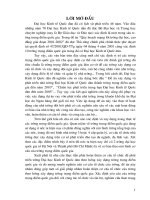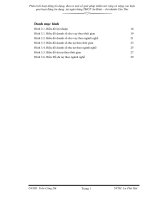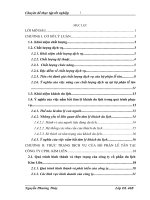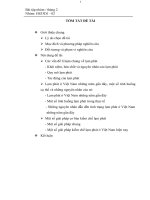nâng cao kĩ năng nghe nói của sinh viên năm ba ngành ngôn ngữ anh giúp sinh viên xác định được khó khăn trong kĩ năng nghe nói và đưa ra một số giải pháp để nâng cao kĩ năng hơn bên cạnh đó, khảo sát những khó khăn mà sinh viên đã gặp phải improve listen
Bạn đang xem bản rút gọn của tài liệu. Xem và tải ngay bản đầy đủ của tài liệu tại đây (430.86 KB, 15 trang )
THU DAU MOT UNIVERSITY FACULTY OF FOREIGN
LANGUAGES
REPORT WRITING
COMMON METHODS FOR THIRD-YEARS MAJOR TO SELF-STUDY
ENGLISH SPEAKING SKILLS
Student name: Dang Thi Cam Nhien 1822202010546
Class: D18AV08
Course: 2020-2021
Major: English Language
Lecturer: Mrs. Tran Thanh Du
Binh Duong, 11/2020
TRƯỜNG ĐH THỦ DẦU MỘT
CỘNG HOÀ XÃ HỘI CHỦ NGHĨA VIỆTNAM
KHOA NGOẠI NGỮ
Độc lập –Tự do – Hạnh phúc
Bình Dương, ngày ….. tháng ….. năm 2020
PHIẾU CHẤM ĐIỂM MÔN REPORT WRITING
1. Họ và tên giảng viên chấm: ..........................................
2. Họ tên sinh viên: ........................................................... Mã số SV: .......................................
3. Lớp: …………….. Khoá học: ...................................... Ngành: ............................................
Phần đánh giá và cho điểm của giảng viên: (Theo thang điểm 10, lẽ đến 0.1 điểm)
4.
Các cấp độ đánh giá
Điểm
Điểm
TT
Nội dung
đánh
tối đa
Thấp
Xác định
Trung bình
Cao
Xác định được tính
Tên đề tài hay, phù
liên quan chuyên
hợp với chuyên
ngành.
ngành.
giá
Tên đề tài khơng rõ
1.
đề tài
0.75
ràng.
nghiên cứu
2.
Mục đích,
Khơng trình bày
Trình bày được
Trình bày được mục
mục tiêu
được yêu cầu cơ bản
mục đích nghiên
đích, mục tiêu
nghiên cứu
của việc nghiên cứu.
cứu.
nghiên cứu rõ ràng.
0.75
Rút ra được các luận
Chỉ liệt kê không
Rút ra được các
điểm và có đánh giá
rút ra được các luận
luận điểm và có
của các tác giả
điểm của tác giả
đánh giá của tác giả
trước, từ đó đưa ra
trước.
trước.
luận điểm nghiên
Tổng quan
3.
tình hình
1.5
nghiên cứu
cứu mới.
Chưa trình bày được
Trình bày được các
Trình bày được các
phương pháp, cách
Thiết kế
4.
phương pháp, hướng
phương pháp,
thức tiến hành
nghiên cứu và các
nghiên cứu
0.75
hướng nghiên cứu
nghiên cứu một
bước nghiên cứu rõ
rõ ràng.
cách rõ ràng.
ràng, khoa học.
Thể hiện rõ phương
Thu thập tài liệu thứ
Thể hiện rõ cách
cấp, sơ cấp trong
thức thu thập tài
Tiến hành
5.
pháp thu thập tài
nghiên cứu
0.75
liệu, hướng xử lí tài
nghiên cứu.
liệu.
liệu khoa học.
Văn phong
Bài viết
Có nhiều lỗi ngữ
pháp, văn phong
khơng phù hợp.
Đạo đức
Khơng trung thực,
6.
7.
nghiên cứu
Có ít lỗi ngữ pháp, Hầu như khơng có lỗi
văn phong tương đối ngữ pháp, văn phong 1.75
phù hợp
phù hợp, hành văn trơi
trãi.
Trung thực, có trích
Trung thực, có trích
có hiện tượng sao
dẫn nguồn tư liệu
dẫn nguồn tư liệu rõ
chép, trích dẫn
rõ ràng.
ràng. Tơn trọng các
khơng rõ ràng.
quan điểm và nhận
định của các tác giả
khác.
Đúng quy cách,
Đúng quy cách, văn
khơng có lỗi hành
phong rõ ràng,
văn, câu chữ.
khơng lỗi hành văn.
Khơng đúng quy
8.
Hình thức
định.
Có độ dài khơng
đúng quy định: ít
Có độ dài gần đúng
quy định đúng quy
Có độ dài đúng quy
0.75
1.5
hơn 5 trang hoặc
định:6 trang, hoặc
định: 4-6 trang và
11 trang và hình
hình ảnh, biểu mẫu,
ảnh, biểu mẫu, sơ
sơ đồ trình bày hợp
đồ trình bày khá
lí, khoa học.
nhiều hơn 10 trang,
9.
Độ dài
1.5
hoặc có độ dài đúng
quy định nhưng
hình ảnh, biểu mẫu,
hợp lí.
sơ đồ quá nhiều.
Tổng số:
6.
10
Nhận xét khác:
........................................................................................................................................................................
........................................................................................................................................................................
........................................................................................................................................................................
........................................................................................................................................................................
........................................................................................................................................................................
........................................................................................................................................................................
........................................................................................................................................................................
................
Giảng viên chấm
(Kí tên)
COMMON METHODS FOR THIRD-YEARS MAJORS TO STUDY
TRANSLATION-INTERPRETATION
Dang Thi Cam Nhien
Abstract
This study aims to find solutions to improve the English speaking skills of Thu Dau Mot
University students. The sample includes 35 students (25 females and 10 males) and all of
them are third-year students in English language. To achieve the objectives of the present
study, we used questionnaires to collect data. The results of this study revealed that third-year
students of Thu Dau Mot University face many problems related to speaking English, such as:
less vocabulary, grammar, lack of confidence, do not have ideas, slang/idioms and
pronunciation. The results also showed that the most frequent problems were the limited
vocabulary among students, while the least frequent problems were the difficulty in
slang/idioms. This study also presented some of appropriate solutions for students to
overcome the weakness as well as improve English speaking skills, such as: using speaking
English apps (Elsa, Cake, …), learning English through social media (Youtube, Facebook,…),
finding foreigners to practice, and attending all the classes in University to practice Listen
skills.
Key words: Thu Dau Mot University, English speaking skills, third-year students
Introduction
Nowadays, English language plays a key role in almost areas including working and
education all over the world. In 2006, English is considered as the "mother tongue" of 600700 million people, the second language of more than 1.5 billion people. In 2015, English has
become primary language of 67 nations around the world and secondary language of 27
countries. That is a reason why young people nowadays choose English language as their
subject at university to follow.
Besides that, the English language major is one of the fields that graduate with higher
employment rates than other professions. It is presented in almost all fields and jobs. As it is
mostly used in the internet, the present e-business has been in progress and attaining good
results in the field of trade and commerce. It is also the language used not only by the
diplomats but also by some world organizations such as UNO, WHO, UNESCO, UNICEF,
OPEC, EFTA, ASEAN, UNHRC, WTO, ILO, BRICS, INTERPOL and so on (Parupalli,
2019). When a student applies for a job and has an additional degree in English, it takes
precedence over the others. However, learning a language is not a small deal. Moreover, as
observed, most of the third-year English language students are very shy about
communicating, socializing with their friends and their teachers, or giving presentations in
English, even some of them do not communicate in English well.
Realizing that students' communication skills are still very limited, many of them do
not fully express their ideas, have poor language ability, or are influenced by personal
emotions. On the other hand, one of the other reasons are maybe from the colleagues and
classes in training students in basic skills such as communication are still very limited, from a
theoretical point of view is the lack of practice and activities. Limited collective, club
organizations also cause difficulties for students to apply English in communication.
For the students majoring in English language is no exception, they are also having
difficulty communicating right in their major. Maybe they are lacking background knowledge
or that the teaching’s methods at the university level is different from the high school methods
and just like that they are discouraged because after two years of college, students do not even
speak very well and confidently. When university students graduate from colleagues and it
will affect to find jobs because communication skills are not good.
For these reasons, we decided to conduct a research paper to find the appropriate
method for third-year students to improve our speaking skills.
Methodology
We conducted a survey of 35 third-year English language students (25 females and 10
males) at Thu Dau Mot University. The data are accurate and up-to-date. In fact, in order to
accomplish the objectives of this study, the primary methods used were questionnaires. The
questionnaires were carefully constructed and reviewed on the basis of research objectives,
including 8 questions, of which personal information and 5 multiple choices. The participants
give their comments on a scale of one to five for each question (1- Very bad, 2- Bad, 3Normal, 4- Good, 5- Very good). After the survey, the data are classified into different
categories by removing inappropriate or unnecessary information. Then, the information is
selected based on the outline laid out; and is analyzed to highlight the situation. In addition,
using charts to evaluate and statistic data.
Research questions:
This study guided by the following research questions:
1.
What difficulties do students face when studying Translation-Interpretation?
2.
What common study methods are the students using in developing Translation-
Interpretation skills?
Literature
Euis, M., Nazzala, A.R., Danang, D.H. & Nurmala, D. (2020) investigated a method to
increase English Speaking skills through Youtube. They focused on implementing Youtube as
a method for teaching speaking that is different, interesting, and fun, while creating a
classroom atmosphere that is comfortable and increases students’ enthusiasm for learning.
The sample of the study was 10th grade in SMA IT Rahmaniyah by observation. They found
that using Youtube was very effective because students speak English with more confidence
and expression. In addition, students also were not worried about the phrases they used when
speaking because they could see how foreigners speaking English properly and correctly.
However, learning through Youtube also has lot of limitations. Students need a long time to
bear in mind all the conversation from the video. Moreover, students are often distracted by
popular videos on Youtube rather than learning.
Lai-Mei, L. & Seyedeh, M. A. (2017) studied a research “An Analysis of Factors
Influencing Learners’ English Speaking Skill”. They showed four difficulties in speaking
English. First, these are inhibition, lack of topical knowledge, low participation, and mother
use (Tuan & Mai, 2015). Secondly, the learners cannot remember anything to say and they do
not have any motivation to express themselves. In addition, the participation in speaking is
very low. The final difficulty is speaking ability because students do not have enough
knowledge and vocabulary about topic they talk. In addition, they also showed that there are
five factors affecting Speaking Skills: pertinent to performance conditions, affective, listening
ability, topical knowledge and feedback during speaking activities
Abdel-Rahman, Al. E., Dr. Mahmoud, A. Al, Dr. Samer, M. Al & Dr. Fadi, Al. (2016)
conducted a research “Improving English Language Speaking Skills of Ajloun National
University Students”. The sample of the study included 20 students (12 female students and 8
male students) and all of them are studying English language. They used semi-structured
interview as an instrument for data collection. They found that the students of ANU facing
with many problems in speaking English, such as confusing and embarrassment; students did
not learn speaking lessons correctly at school, and have problem in pronunciation. In addition,
students are facing with the limited amount of vocabulary. They also found some solutions for
students such as practicing speaking English inside and outside the classroom effectively,
using modern social media to communicate in English and to express the students’ feelings
and needs.
Thanyalak Oradee (2012) researched a method for students to develop speaking skills
by using three communicative activities: Discussion, Problem-Solving, and Role-Playing. The
sample of the study consisted of 49 students at a secondary school in Udon Thani, Thailand
and classified by high, medium, and low according to their abilities of English speaking
proficiency level. She found that the students’ English speaking abilities after using three
communicative activities were significantly higher than before their use. (Pretest = 60.80;
Posttest = 85.63). in addition, the students’ attitude towards teaching English speaking skills
using the three communicative activities were rated as good (X = 4.50).
Results and analysis
This section presents and discusses the results of the study according to the research
questions.
Fig 1:
The
difficulties’ students are facing in speaking English
Figure 1 shows that the difficulties’ students are facing in speaking English. It
includes: less vocabulary, grammar, lack of confidence, do not have ideas, slang/idioms and
pronunciation.
-
Less vocabulary:
Vocabulary is one the most important parts in learning a foreign language because
vocabulary is very diverse and ambiguous. According to the survey, we realized that about 31
students (88.6%) do not have a wide range of vocabulary to communicate with the others.
-
Grammar:
The above diagram shows us that grammar accounts for only a small part of speaking
English about 37.1% (13 students). When they communicate with others, they do not care
about grammar because if they pay more attention to correct grammar. It will interrupt the
conversation or sometimes it makes the speaker forget their thoughts.
-
Lack of confidence:
The above diagram shows us that grammar makes up an important part in speaking
English roughly 71.4% (25 students). When students communicate with others, especially
when they present in front of many people, they feel ashamed and not confident, resulting in a
lack of fluency. They are afraid of making mistakes, so they are scared to speak or present.
-
Do not have ideas:
According to the table above, many students have problems with lacking ideas or have
no ideas when speaking English about 29 students according for 82.9%. When they
communicate, they cannot understand the answer' partner.
-
Slang, idioms:
This is considered an important part of speaking English because It helps us to
understand what foreigners say and then, we can communicate well. However, it is also an
extremely difficult part for students because it is difficult for non-native speakers to figure out
the image of the idiomatic expression due to the different cultures of each country. According
to the survey results, about 11 out of 35 people (accounting for 31.5%) have difficulty with
this problem.
-
Pronunciation:
For some students in Southern Vietnam, they did not distinguish a few sounds. In
English, the system of vowels and consonants has many different and complex words.
Besides, stress is also very complicated and difficult to distinguish because when the stress is
wrong it will translate another meaning. About 29 out of 35 third-year students have
pronunciation problems.
Fig 2. The ways to improve speaking English skills
Figure 1 shows that the ways that required from the third-year students inside the
classroom at TDMU are: learning English through apps (Elsa speaking, Cake, etc), social
media (Youtube, Facebook, etc), find foreigners to practice and attend all the classes in
University.
-
Learning English through apps
The results of this study showed that there are many learners choose apps to improve
their English (10 people). However, learning English apps do not useful for students (more
than 15 people).
-
Learning English through social media
The results presented that social media is more useful than apps (more than 15 people).
Along with the explosion of social media in recent years, the need to learn English is no
longer limited to English-specific courses or applications. Social media platforms have helped
create a new wave of English enhancement, from online courses to private groups, everything
can be free. Nowadays, not only young people but most people of all ages are participating in
social networks, so learning and receiving English here is really handy, not surprising when
"LETSM" receives feedback is very positive (more than 5 people rate it is very good)
-
Find foreigners to practice
This is definitely a highly effective way, the majority of them voted good and very
good. Only a few votes in an ineffective direction possibly because approaching a foreigner is
quite difficult not only that but also have to talk to them. This also points to two problems,
first maybe their living area does not have the ability to contact foreigners, secondly due to
their fear of facing a stranger but also of the different ethnic country and it also shows that
person is lacking confidence. If you have the opportunity to try bravely find a foreigner to
chat with, make sure your English level will improve faster than you think.
-
Attend all the classes at University
Returning to the traditional English learning style but with a more upgraded version.
Instead of learning the basics, now coming to university environment, we will experience
more interesting and attractive things of English. With more than 15 people feeling that
learning English at school is too normal, the other part thinks that this is really a practical and
accessible method when they have teachers to guide them.
Findings and discussion
This study aims to find solutions to improve the English speaking skills of Thu Dau
Mot University students. The assessment is based on the opinions of 35 students of Thu Dau
Mot University. Many positive feedbacks were given, but there are still a few reviews that the
above methods are not really effective, the assessment results depend on personal needs and
feelings. In order to learn more about students' thoughts and desire to develop English skills,
we have conducted this survey, along with which to find highly effective learning methods
that are available to them. Since then, it helps us to easily approach English without any
obstacles.
However, the survey is still limited, because not everyone gives a realistic and fair
assessment. In addition, we probably have not given the full range of methods you want to
work towards.
We have a need to know more, we will continue to expand our knowledge to study this
issue more seriously and clearly so that there is more suitable English learning pathway for
everyone.
Conclusion
Finally, we can give a general assessment that with the explosion of social networks,
people will have a positive rating for English development on Facebook and Youtube
platforms. Since these are really ideal environments for you to cultural and knowledge
exchange as well as use your learned skills to debate, it is also really easy because you can
connect with people anywhere in the world and whenever you have free time. However, the
remaining methods also bring their own effectiveness and are worth considering for
implementation. If we are a person with less confidence but still want to improve our English,
then apps dedicated to learning English will be a great choice. If you are confident and want
to improve English quickly, just come to Ho Chi Minh city and choose an area with lots of
foreigners then the opportunity to talk with them is not too difficult because the foreigners are
friendly and open. Taking English classes at school is not a bad idea, this is definitely a place
where you will acquire the extremely core knowledge and with the guidance of the teachers,
English is no longer another too scary subject, but remember to complete homework.
References
Abdel-Rahman Al. E., Dr. Mahmoud A. Al, Dr. Samer M. Al & Dr. Fadi Al. (2016) Improving
English Language Speaking Skills of Ajloun National University Students. Retrieved
from:
/>_of_Ajloun_National_University_Students
Euis, M. & Nazzala, A. (2020) Increasing English Speaking Skills through Youtube. Retrieved
from: file:///C:/Users/Admin/Downloads/1954-6332-2-PB.pdf
How
many
people
in
the
world
speak
English?
Retrieved
from:
/>option=com_content&id=21011&tmpl=component&task=preview&lang=vi&site=142
Lai-Mei, L. & Seyedeh, M. A. (2017) An Analysis of Factors Influencing Learners’ English
Speaking Skill. Retrieved from: file:///C:/Users/Admin/Downloads/57002920170104.pdf
Parupalli, S. R. (2019) The Role of English as a Global Language. Retrieved from:
/>LOBAL_LANGUAGE
Thanyalak, O. (2012) Developing Speaking Skills Using Three Communicative Activities
(Discussion, Problem-Solving, and Role-Playing). Retrieved from:
/>
Tuan, N. H., & Mai, T. N. (2015). Factors Affecting Students’ Speaking Performance at LE
Thanh Hien High School. Asian Journal of Educational Research, 3(2), 8-23
Questionnaire
1. Full name:......................................Class: ...............
2. Gender:.....................................................................
3. Gmail:......................................................................
4. How long have you learned English?
o 3 years
o 4 years
o >= 5 years
5. What are your difficulties in speaking English?
Less vocabulary
Grammar
Lack of confidence
Do not have ideas
Slang, idioms
Pronunciation
Rating:
6. How important these elements in learning speaking English?
Very
bad
Bad
Normal
Good
Very
good
Pronunciation
Grammar
Vocabulary
7. How useful are these ways of learning English Speaking Skills?
Very
bad
Bad
Normal
Good
Very
good
Learning English through
apps (Elsa Speaking, Cake,
etc)
Learning English through
social media (Youtube,
Facebook, etc)
Find foreigners to practice
Attend all the classes in
University
8. What useful methods to improve English speaking ability?
Very
bad
Expand vocabulary
Practice with Music and
Movies
Listen more
Self-talk
Bad
Normal
Good
Very
good
Find An English-Speaking
Conversation Partner.
Learn phrases rather than
single words








